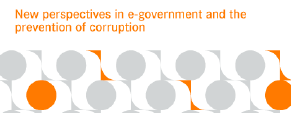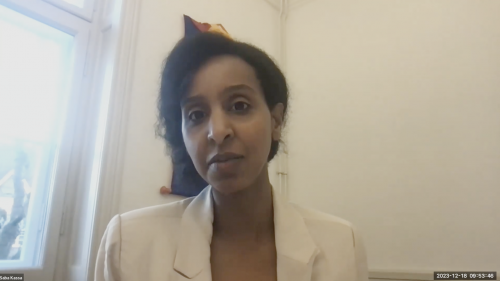Scaling up private sector use of e-government for corruption prevention

Last week, we presented the results of the Basel Institute on Governance’s new report entitled New Perspectives on E-Government and the Prevention of Corruption at a side event on innovative solutions to corruption prevention at the United Nations Convention against Corruption (UNCAC) Conference of States Parties (COSP) in Vienna, Austria.
Members of the panel at the COSP side event and participants discussed the use of e-government and its potential to reduce corruption in various ways, and whilst not a solution on its own it was noted that there is a great potential to scale up efforts:
“Governments are increasingly investing in e-government solutions and the private sector should respond to the opportunities this creates by making their use part of a company’s anti-corruption strategy,” said GSK’s Andrew Daniels, Head of Anti-Bribery and Corruption, Sanctions & Export Controls Centre of Excellence. “We, at GSK, believe these systems reduce our exposure to bribe solicitation and make our government interactions more efficient, transparent and traceable.”
E-government generally refers to the use of information and communication technologies (ICT) to transform relations between citizens, businesses and various branches of government. The basic premise is that by reducing face-to-face contact with government officials, e-government can play a significant role in reducing corruption.
Our report examines the rise of e-government and its effects. It provides a literature review on the correlation between e-government and corruption prevention and provides illustrations of a range of e-government solutions adopted by several different countries from around the world.
The report also presents the results of an anonymous web survey conducted by the Basel Institute, which sought to assess the extent to which companies are aware of and use e-government solutions, as well as private sector perceptions of the effects of such tools on preventing corruption and bribery.
The Basel Institute received 197 responses to the anonymous web survey, of which 83% were private sector actors from 33 different industry sectors from the Americas, Asia-Pacific and China, Europe, and the Middle East and North Africa.
Most private sector actors have not yet grasped the potential of e-government tools for ensuring anti-corruption compliance. Our survey showed that only just over half (55%) of private sector respondents are currently using e-government tools in their business operations. Of those that do so, similar majorities use e-government for the purpose of reducing the time to complete a transaction (61%) as to reduce the risk of a demand for a bribe (60%). Respondents most frequently used e-government tools in the fields of e-procurement and e-tax, primarily motivated to reduce bureaucracy in those processes. By contrast, respondents used e-government tools less frequently in the fields of e-customs and e-sourcing, but when they did, they indicated the highest levels of motivation to reduce corruption in these transactions.
Global healthcare company GSK recognises the important role e-government can play in corruption prevention, which is why they supported the Basel Institute to undertake this research. GSK’s Anti-Bribery and Corruption Standard (an excerpt is set out in the annex of the report), requires all country managers to encourage their business to use any available schemes or systems that reduce face-to-face contact, particularly when interacting with government officials or making financial transactions, such as in the areas of: e-invoicing; e-filing of taxes or other administrative acts; e-procurement, e-tendering, e-sourcing, using any electronic government platforms, including trade facilitation schemes.
Although the analysis on the actual impact of e-governance on corruption prevention is relatively under researched, some independent research papers and studies by the World Bank support this conclusion. Our modest survey adds some more evidence in this direction.
We encourage companies to follow GSK’s initiative to integrate the requirement of using e-government tools in their anti-corruption compliance policies and procedures. We also call upon governments to harness the private sector as a driver of economic growth and development and to respond to private-sector requests and needs when developing their e-government strategies. Finally, we encourage academics and practitioners alike to undertake further research and analysis on the relationship between e-government and corruption.
The greater the awareness of the potential for e-government to prevent corruption, the more e-government will be used, and the better governments and the private sector can tailor e-government solutions as an effective measure in the fight against corruption.



